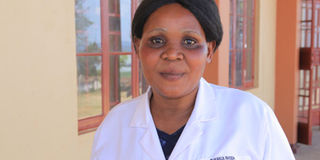Called to serve in Luzira prison

Rhoda Bukhanza
What you need to know:
serving inmates. Rhoda Bukhanza (40) is the senior medical officer at Murchison Bay Hospital in Luzira prison. Since the time she started working as a medical personnel in 1992, she has never worked anywhere else except in prison. Was she called to serve in prison? Beatrice Nakibuuka shares her story.
As I strolled with Rhoda Bukhanza around the women’s prison facility in Luzira, her friendly character could not go unnoticed. She is warm and welcoming. Many prisoners refer to her as musawo (doctor) while others call her maama (mother).
Bukhanza has served in Murchison Bay Hospital, Luzira as a nurse and medical officer and a mother to countless inmates for more than 27 years. It is because of this experience perhaps that she was made the health overseer at the prison’s women wing.
Growing up, Bukanza always dreamt of being a doctor, but because her parents did not have enough money to send all their 14 children to school, when she completed Senior Four, she went to Lira School of Nursing, where she acquired a certificate of general enrolled nursing.
She went to Magale Mixed Primary and Secondary schools in Mbale, currently in Namisindwa District. When she completed her certificate, she was posted by the Ministry of Health to Murchison Bay Hospital in Luzira in 1992.
“In 1997, I went to pursue a certificate in HIV treatments and counselling because it was relevant to the kind of work I was doing. I would attend the training while I worked.”
In 2001, she was given a study leave to pursue a diploma in Clinical Medicine and Community Health from Mbale School of Clinical Officers until 2003.
She graduated with a Diploma in Palliative Care from Hospice, Makindye in 2008. She would attend classes during weekends and the time she was off duty.
The following year, she acquired a diploma in Health Service Management from Mengo School of Allied Health Professionals.
“In 2008, I was promoted to senior medical officer, a position I have held to date. In 2011, I was transferred to Mbale as a regional health coordinator for eastern region until 2014 and then transferred back to Murchison Bay hospital,” she recalls.
In 2014, she was made the officer-in- charge of Luzira Women Health Centre III. Bukanza undertakes governance and leadership, the human resource, infrastructure and healthcare delivery roles for the inmates.
Asked what working with inmates is like, Bukhanza says: “Prison is not an easy place to work in but what motivates me is the fact that colleagues refer to me patients whom they say are unruly, whom I manage with ease. When I counsel them, they are calm and are able to cope and learn to live with HIV.”
Sad tales
In 2016, Bukhanza recalls a 71-year-old woman, who was bedridden, with bedsores, yet she was on death row. She was very scared, got diarrhoea and refused to eat or take her ARVs.
“I tried to speak to her, referred her to Mulago hospital but she was very depressed and was not listening. Her family neglected her and when we tried to call all the contact numbers of her children she availed, none was going through.”

Rhoda Bukhanza shows guests around the health facility that she oversees at Luzira. Above: She displays some of the crafts made by inmates. Photos by Beatrice Nakibuuka.
Her immunity had weakened and after two weeks, she passed on. “This woman would have lived longer if I had the chance to interact with her early enough. She wanted to speak to someone,” Bakunzha says.
Lessons
While treating prisoners, Bukhanza says: “We do not focus on the crimes they committed, otherwise we would not be treating them. We consider them as any other patient. We are also required to remain optimistic that no matter the crimes they committed, many can change. When you get time to interact with inmates, some of them are really good people.”
She also realised that like other people, prisoners want to be listened to. They need to hear words of courage and hope because many of them worry about their children and relatives they left home or how they will manage life after they have been released from prison.
“I am glad that as a single mother, I have been able to send my three children to school but my worry is that I am nearing retirement age but I do not have a house” she says in a sad teary voice.
Her schedule
Murchison Bay Hospital allocates special clinics for specific conditions that need attention, which Bukhanza supervises. Mondays, Thursdays and Fridays, for instance, are days for the general clinic and a health talk where inmates get information on disease control and prevention, as well as the importance of getting the right treatment.
“On Tuesday, we dedicate the entire day for inmates living with HIV so we run an ART clinic for those that need a review or a refill. Some have questions they want to ask doctors. Wednesdays are for people who have TB. We also see the patients who may have missed their appointments when they were attending court sessions,” Bukhanza says.
She remarks that they also have night duty shifts to treat emergency cases that arise in the night. Sometimes she is on a day or night duty shift like any other health worker.
Challenges
Bukhanza recalls a time when the heath service in the prisons almost cost her life with a lot of psychological torture, social challenges to the family and economically at the time there were concurrent unexplained transfers in 2008, 2009, 2010 to upcountry.
“Four years after I had settled, I was transferred back to Luzira in 2014. My children were tortured psychologically and declined in academic performance because we were literally always on the move.”




